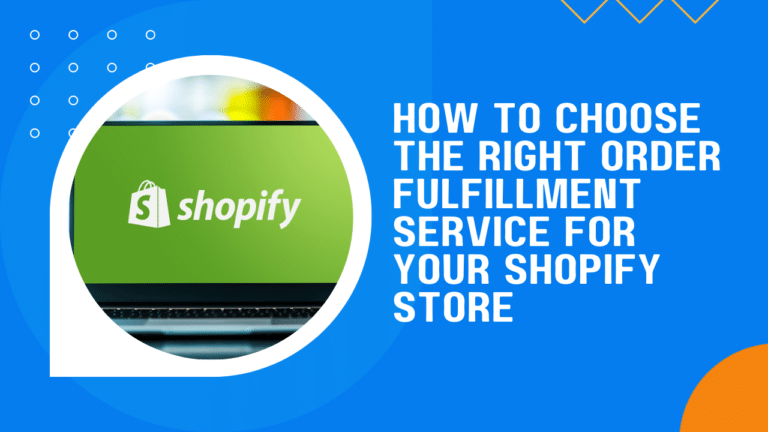Running a Shopify store? Then you know that getting products into your customers’ hands is a big deal. But it’s not just about shipping boxes. It’s about making sure those boxes get there on time, without errors, and in a way that makes your customers happy.
That’s where choosing the right order fulfillment strategy and partner comes into play. This article will walk you through what you need to know to make a choice that fits your business needs.
Why Order Fulfillment Matters for Shopify Stores
You’ve got a great product and a sleek Shopify store to showcase it. But what happens after the “Buy Now” button is clicked can make or break your business. Efficient order fulfillment isn’t just a back-end operation; it’s a key player in customer satisfaction and business growth.
They expect quick, accurate, and hassle-free delivery. A delay or a mix-up can lead to negative reviews, and in the age of social media, word spreads fast. On the flip side, a smooth experience can turn a first-time buyer into a loyal customer.
Streamlined order fulfillment means you can handle more orders in less time, cutting down on operational costs. This efficiency allows you to scale your business more easily, taking on more customers without sacrificing quality of service.
In short, getting your order fulfillment right can lead to happy customers and a thriving business.
Key Criteria for Choosing a Fulfillment Company
Selecting the right Shopify order fulfillment service is more than just a checkbox on your to-do list; it’s a strategic move that can significantly impact your business. To make the most informed choice, there are several key criteria you should consider. Let’s explore them in greater detail.
Cost
When it comes to cost, it’s not just about the upfront fees or the per-order charges. You should also consider the long-term value the service provides. Are there additional costs for warehousing, returns, or special packaging?
Does the service offer volume discounts as your business grows? Make sure to read the fine print and understand the full scope of what you’re paying for. A seemingly economical choice may not be so budget-friendly when all costs are considered.
Speed
Customer expectations for fast delivery have never been higher, thanks in part to giants like Amazon setting the standard. The speed at which your fulfillment company can pick and pack and ship orders is crucial. Investigate their average processing times and whether they offer expedited options.
Scalability
As your Shopify store grows, your fulfillment needs will change. You’ll need a service that can adapt to those changes without causing disruptions.
Does the service have the infrastructure to handle a sudden surge in orders, such as during holiday seasons or sales events?
Can they accommodate new product lines or variations with ease in their warehouses?
Scalability is not just about handling more orders; it’s about flexibility and adaptability.
Packaging Options
The type of packaging used in shipping your products can make a significant difference in both customer perception and your bottom line.
Consider whether the fulfillment company offers customizable packaging that aligns with your brand. Are eco-friendly packaging options available?
The dimensions and weight of the packaging can also affect shipping costs, so it’s essential to find a service that offers a range of solutions to meet your specific needs.
Technology Integration
The technology behind the fulfillment solution should make your life easier, not harder. Look for a service that offers robust integration with Shopify, automating as many tasks as possible.
This should include real-time inventory tracking, automated order syncing, and even predictive analytics to help you forecast future inventory needs.
A well-integrated technology stack will not only save you time but also reduce the risk of costly errors like overselling.
Shopify Integration
Seamless integration with your Shopify store is non-negotiable. The fulfillment service you choose should offer easy-to-use plugins or APIs that sync with your Shopify dashboard. This ensures that orders, inventory levels, and tracking information are automatically updated between the two platforms.
Look for features like real-time inventory tracking, automated order importing, and simplified returns management. The smoother the integration, the less manual work for you, allowing you to focus on growing your business.
Questions to Ask Potential Fulfillment Partners
Choosing a fulfillment partner is a significant commitment that can have lasting effects on your Shopify store’s success. To ensure you’re making the best choice, there are some crucial questions you should ask potential partners. Here are a few to get you started:
What is your experience with Shopify?
The first question to ask is about their experience with Shopify. This will give you an idea of how well they understand the platform and can integrate with it. Ask for case studies or references from other Shopify store owners they’ve worked with.
This will give you a clearer picture of their capabilities and how they’ve solved challenges similar to yours.
How do you handle returns?
Returns are an inevitable part of ecommerce, and how a fulfillment service handles them can make or break the customer experience. Ask about their returns policy, the process for restocking returned items, and any associated fees.
Smooth, hassle-free returns processing can turn a potentially negative experience into a positive one, encouraging customer loyalty.
Can you handle peak seasons?
Seasonal spikes in sales, such as during the holidays or special promotions, can strain any operation. It’s essential to know if your potential fulfillment partner has the resources to handle these peaks.
Ask about their staffing levels, extra storage capabilities, and contingency plans for high-demand periods.
This will help you gauge their ability to scale with your business needs.
What are your shipping options?
Shipping is often the final touchpoint between your store and the customer, so it’s important to get it right. Ask about the range of shipping options they offer, from economy to express, and shipping time. If your Shopify store sells internationally, be sure to also ask about their international shipping options.
This will help you understand if they can meet your customers’ expectations for delivery speed and options.
Do you offer branded packaging?
Branded packaging can enhance the customer experience and reinforce your brand identity. Ask if the fulfillment company offers custom packaging among their fulfillment options, and at what cost. This can be an important factor if you’re looking to create a memorable unboxing experience for your customer base.
How do you handle inventory management?
Inventory management is a critical aspect of running a successful Shopify store. Ask how the fulfillment provider tracks inventory, how often they update you on stock levels, and what systems they have in place for reordering.
Effective inventory management can help you avoid stock outs or overstocking, both of which can impact your bottom line.
You might also be interested in our article about Shopify vs. Woocommerce.
Selecting the Right Fulfillment Partner for Your Shopify Store
Choosing the right order fulfillment service for your Shopify store is a decision that shouldn’t be taken lightly. The right partner can help you streamline operations, improve customer satisfaction, and even contribute to your business growth.
On the flip side, the wrong choice can lead to logistical headaches, unhappy customers, and lost revenue.
As you move forward, remember to weigh the key criteria we’ve discussed: cost, speed, scalability, and technology integration. Don’t forget to ask potential partners important questions that go beyond the basics, such as their experience with Shopify, handling of returns, ability to manage peak seasons, and additional factors like shipping options, branded packaging, and inventory management.
By taking the time to thoroughly evaluate your options, you set the stage for a more successful and efficient operation.









